Could do better!
My first degree was a rather dismal 3rd class Hons. BA in Religious Studies from Lancaster University in 1974.
I enjoyed the course, especially phenomenology, philosophy, psychology and sociology of religion, plus Nordic religions and Islam, as well as a fascinating course on the macro-history of religions.
I came to appreciate that everyone has a belief system whether they realise it or not, and that understanding how belief systems work and especially the process of conversion, can be really helpful in all kinds of situations. For a multicultural society to function well, people need to have more than a cartoon stereotype of religious believers of any faith, including no-faith. Personally, I think it also relies on people of any faith avoiding a dogmatic insistence that they are right, although I could be wrong.
I didn't realise how useful my studies would ultimately become, once I started working on projects to tackle motivational and corporate cultural issues within public and commercial organisations (Jaguar, Leyland Daf, British Shipbuilders and Highlands Fabricators, to name a few). Looking back I guess I was involved in workforce propaganda as a video storm trooper for Thatcherism. But hey, don't shoot the director-cameraman!
The recent report on religious education makes for alarming reading. Here's just one of many concerning comments:
'The RE curriculum often lacked sufficient substance to prepare pupils to live in a complex world. The RE content selected rarely was collectively enough to ensure that pupils were well prepared to engage in a multi-religious and multi-secular society.'
Queerasure
A few years ago at a poetry festival, a young guy turned up with a book that was almost completely obliterated by black felt tip redactions except for occasional words on the page. But those words put together would often form compelling aphorisms, unusually insightful short poems or wildly random texts. The process seemed like doing crossed word puzzles in reverse but with words not letters. Known as erasure, redacted poetry or even blackout poems, this form has found what seems like its natural home in Justin Torres' queer creative non-fiction story Blackouts. An erudite senior citizen named Juan Gay tells a younger man – with whom he has been briefly institutionalised in the past – about a couple of heavily redacted volumes of a research project, Sex Variants: A Study in Homosexual Patterns. This was a real project initially conducted by Jan Gay, a lesbian woman whose role was eventually made invisible by an all male committee who took over her research. The texts created by the redactions or blackouts are repeated throughout the story. It's a great read, very unusual and a spellbinding mix of truth, imagination and fiction - trumaginiction!
A great review by Emily Witt in LRB - although I think Blackouts is better than she does.
Mise en abymne again
There's a certain amount of mise en abyme in Blackouts but if you would like to have your brain bent this way and that take a look at this.
Quote of the week
comes from Slovenian philosopher, agent provocateur and interventionist Slavoj Žižek. 'Spirit is itself the wound it tries to heal.' Right. Discuss.
The twist
I’m taking it to a higher court, said my father carrying in a battered old family suitcase to the jumble sale where I found the two barleysugar twist candlesticks. They held the candles that illuminated the old air raid shelter at the bottom of our garden that became the den for the Hound Dogs, my two older brothers and myself, named after the Elvis Presly song, You ain't nothing but a ...
Seeing the barley sugar twist pillars on this balcony in Penzance on our recent holiday there, made me wonder about the origin of barley sugar.
According to Wikipedia, ‘the most traditional preparation of barley sugar is known as Sucre d'orge. Elizabeth Pidoux, the first Mother Superior of the Benedictine nuns at the Prieuré Perpétuel de Notre-Dame des Anges in Moret-sur-Loing, France is credited with the first recipe for barley sugar. In 1638, she combined sugar and barley water while experimenting with medicinal remedies.
‘Sucre d'Orge des Religieuses de Moret was often made into small spiral sticks... The name is therefore sometimes used for the Solomonic column in architecture, and twisted legs and spindles in furniture, stair bannisters and other uses.’
I love Italian films.
You must see Matteo Garrone's Io Capitano. Utterly amazing. The odyssey of two youngsters from Dakar to Sicily. Brilliantly acted by Seydou Sarr, Moustapha Fall and Issaka Sawadogo, amongst many others.
Exhibitions on Screen
A superb companion to any exhibition. The film about the big Vermeer exhibition was very informative. Rosy and I recently watched the new film about John Singer Sargent. Great material!
Congratulations to Phil Grabsky and the team at Seventh Art Productions. (I once voiced Mozart’s father for him in his Great Composers phase!)
Toddled?
There's a really curious lyric twist that’s always puzzled me in Darlin' be home soon by the Lovin' Spoonful.
Come and talk of all the things we did today
Hear and laugh about our funny little ways
While we have a few minutes to breathe
And I know that it's time you must leave
But darling, be home soon
I couldn't bear to wait an extra minute if you dawdled
My darling, be home soon
It's not just these few hours but I've been waiting since I toddled
For the great relief of having you to talk to
I just don't get that 'toddled'. Is it me?
Did better!
Just celebrating my Masters in Creative Writing (with distinction! ) at Birkbeck, University of London. I decided to study non-fiction in its various guises and found the course both challenging and highly fulfilling. I’m now working on a book developed from my dissertation.
Here’s me shaking hands with the VC and giving a thumbs up to some of the brilliant team of tutors.
Phunny photos!
I love making people laugh and this recent photo of Rosy next to a very strange man - that’s me – at my MA graduation ceremony at Birkbeck on Monday 22nd, certainly had people falling about, including me. This wonderfully zany shot was taken by my son Joseph. (It’s what sons are for… )
Billy Bunter in a mortar board, someone said. Billy Bunter was a tubby and very greedy public schoolboy character in a series of stories written by Frank Richards between 1908-1940 about a fictional school in Kent, Greyfriars. A BBC TV series ran in the fifties and early sixties.
I was reminded of a similar photo taken a few years ago when wearing a wet suit. Laugh? I almost split the seams!
A patch of Cornish blue sky. That would have been nice when we were there for Easter!
Hope you get some blue. See you next time!


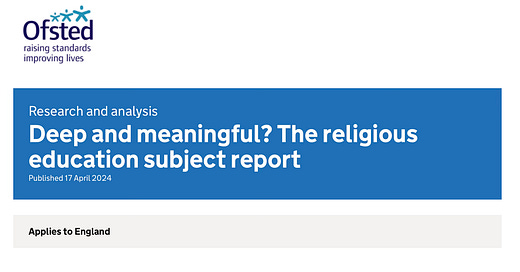



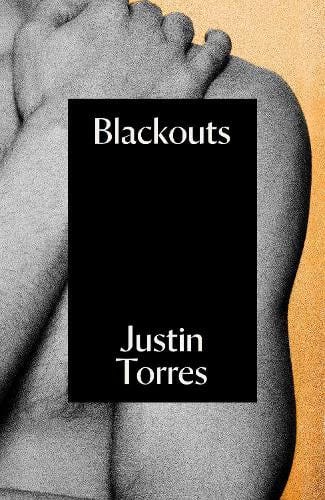
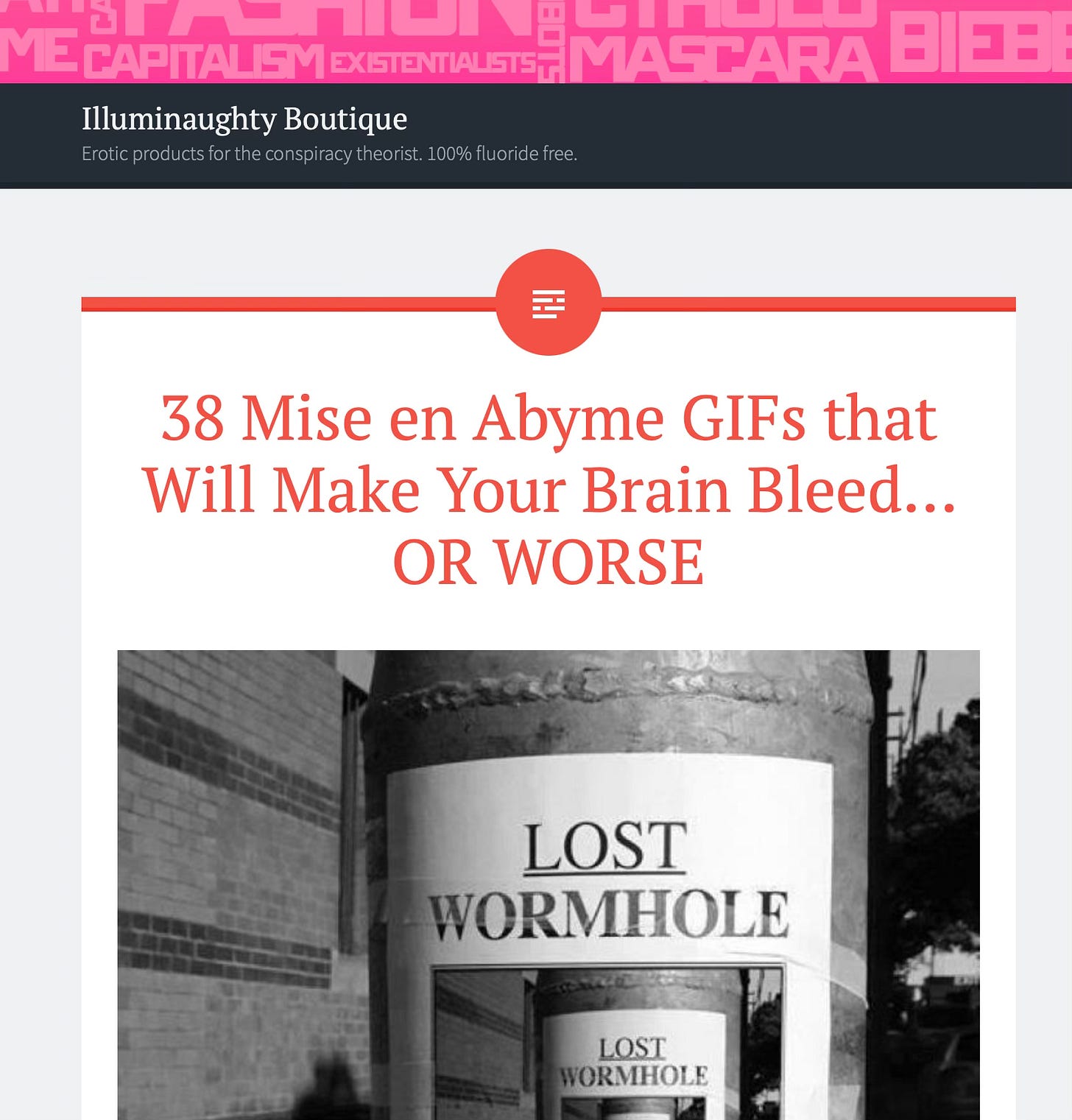
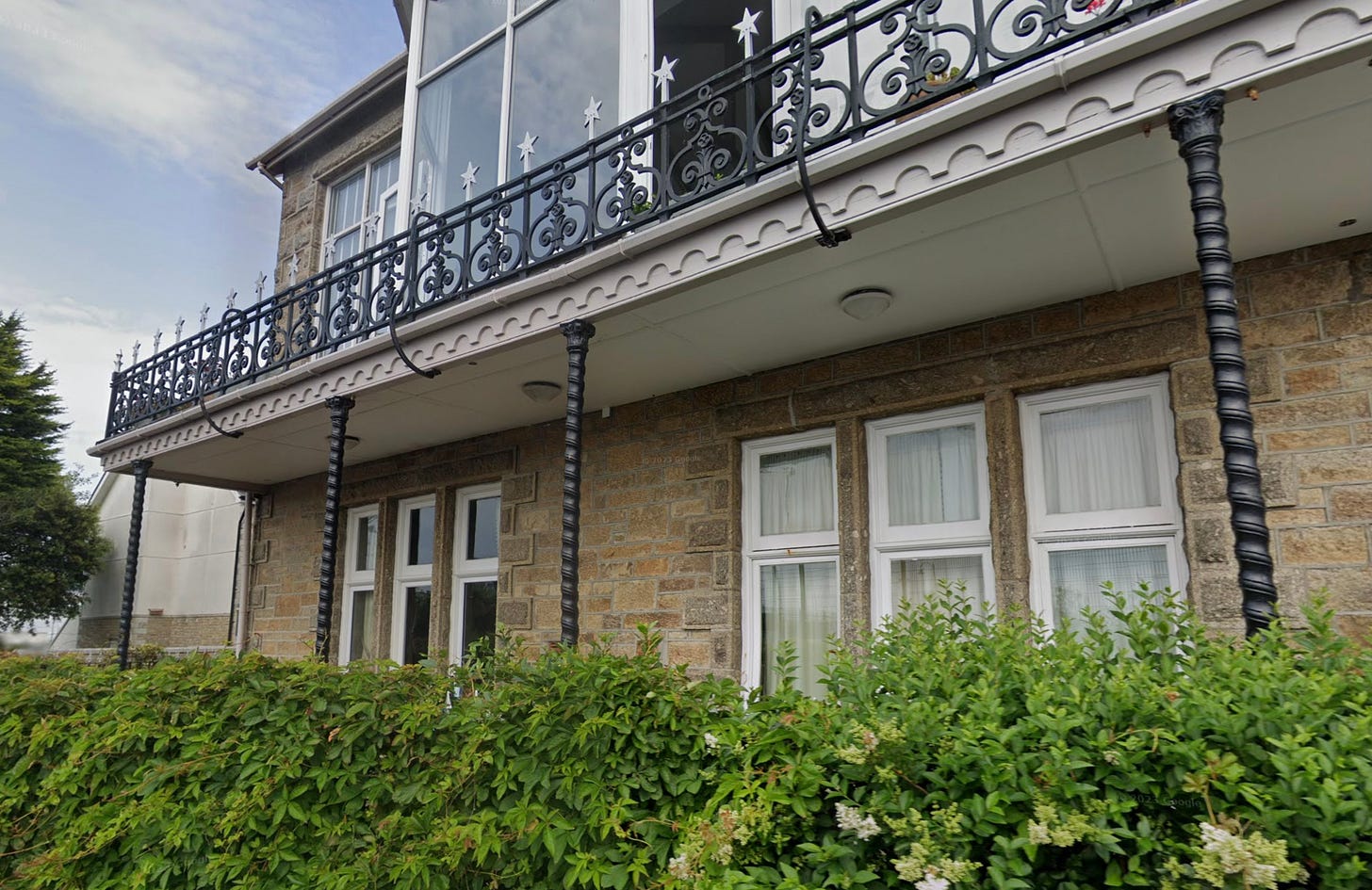
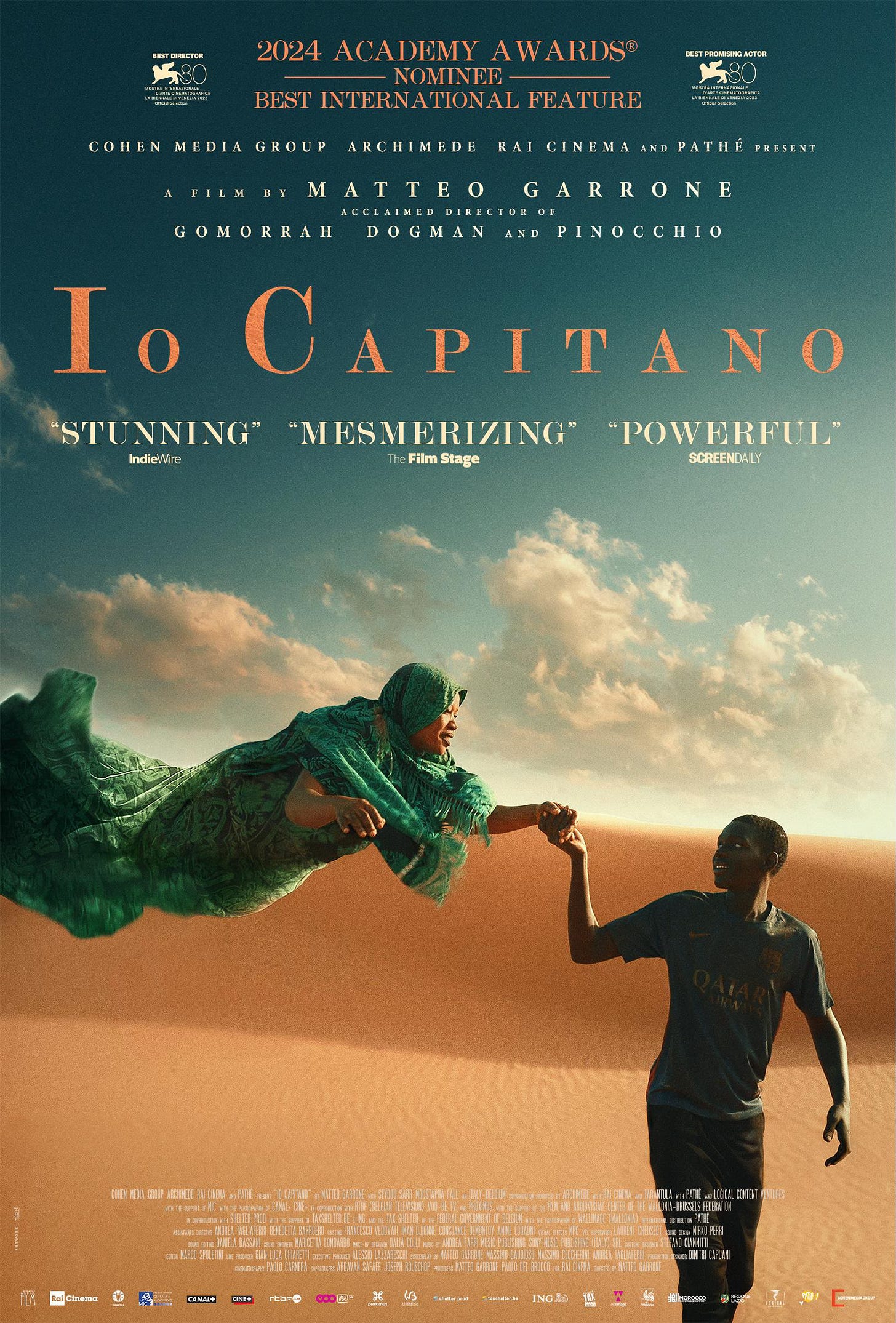

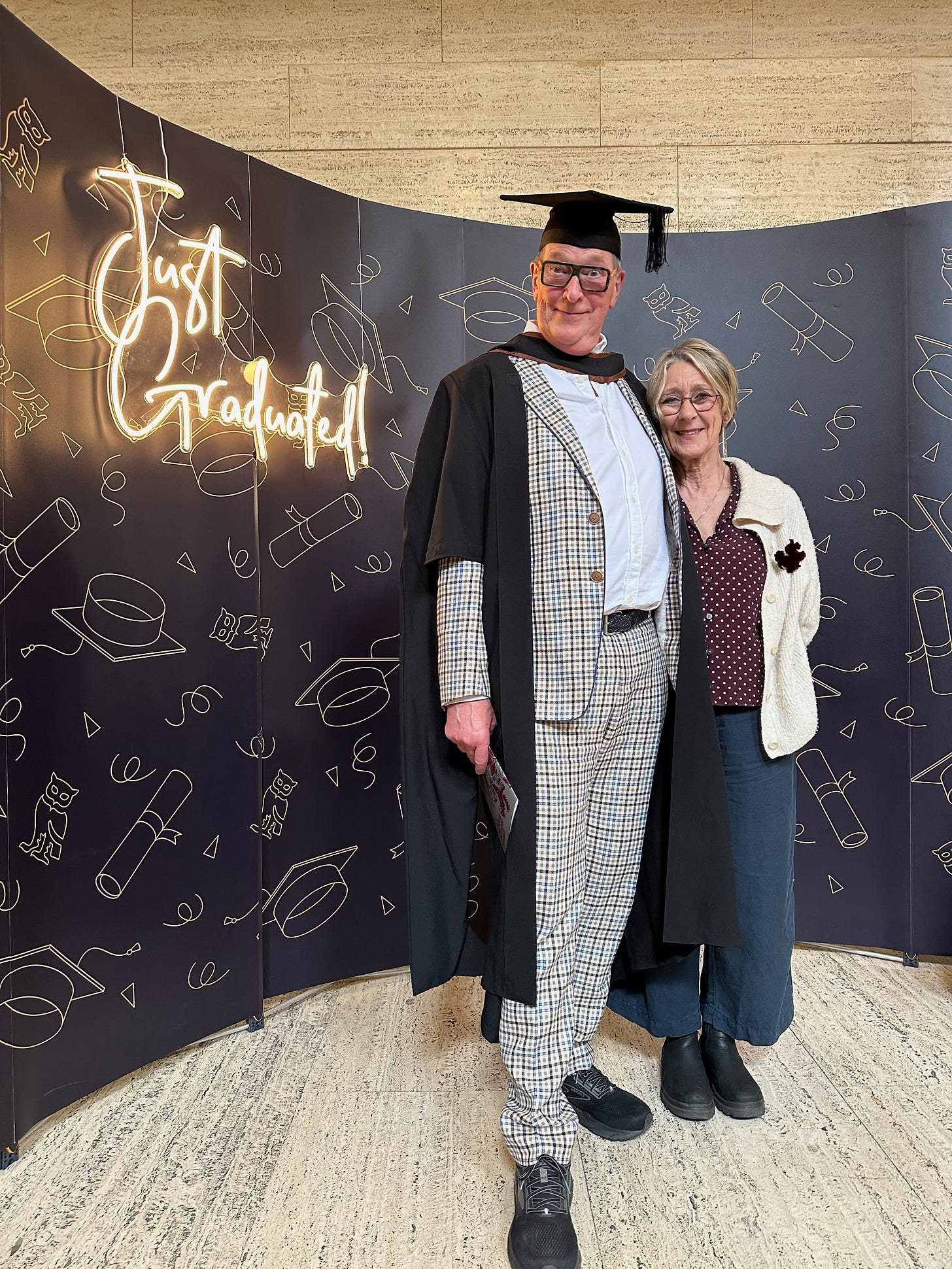
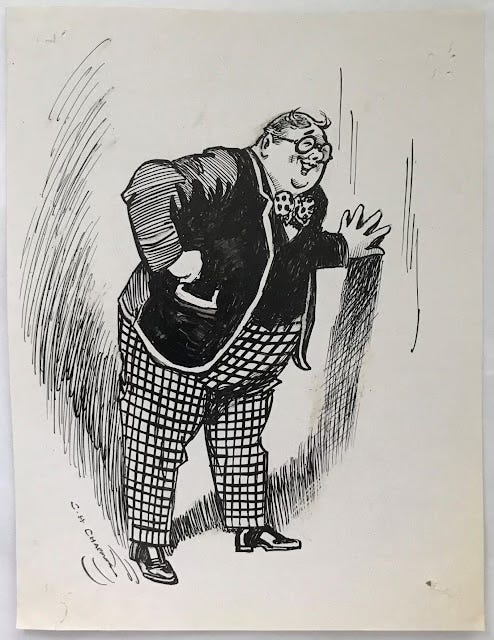


The word was “consequentiality” until wee Al got to it. Maybe there is a way to edit it but it’s not obvious to me.
So; America no Greyfriars reference. Not in their weltaanschaaung ( oh really Al ? No problem? No fix? It’s misspelled you know - no?) Salman Rushdie said Harry Ram Singh was an influence on him but no Amerikan writer ever referenced Bunter. I fear that the American Cultural Hegemony has erased Bunter here as well. What Super Hero has ever uttered useful phrases like “I’m expecting a postal order” or “I say you chaps it wasn’t me who stole the cream buns!” - which inoculated us against the shabby lies and pretensions of fools like Donald Trump, the toad of the remove. In fact, we need to make sure our kids know about Bunter and Mr Toad and Svengali and Goebels before they get swept up in schemes diabolical. The Amerikan canon has only Pinocchio to warn their kids and the carpet baggers in that tale are not clearly enough defined. I really do think moral corruption begins in popular Kultur - “24” enabled Abu Graib, for example. The consequentially is terrific!